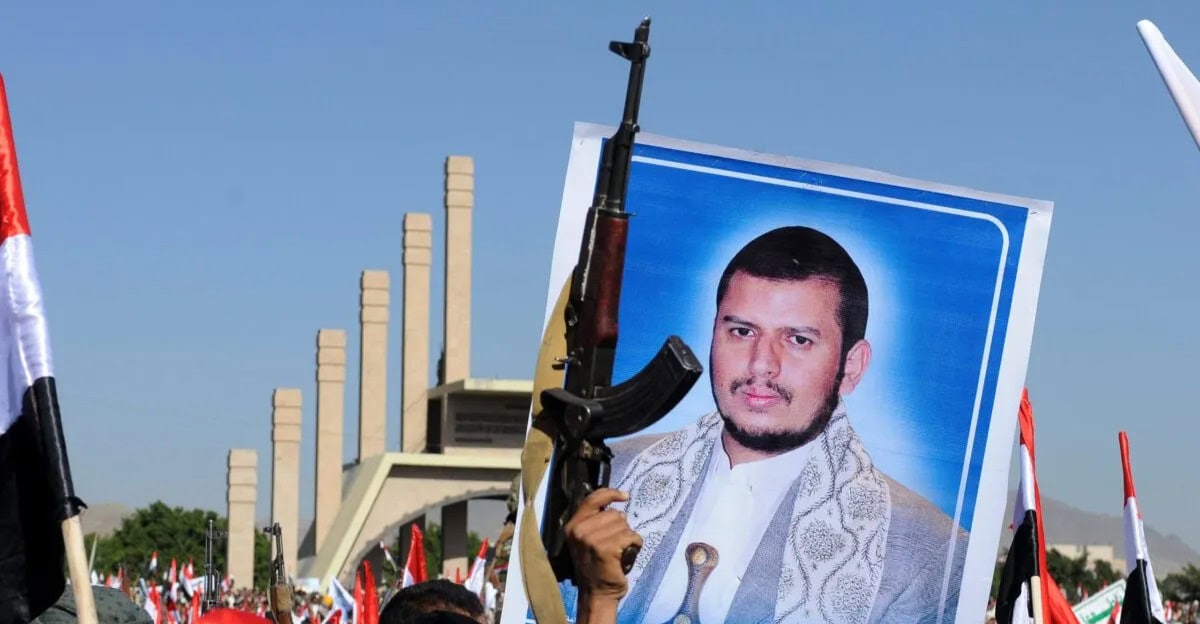
A gathering of Houthi members and supporters (Getty)
Last updated on: 24-06-2025 at 9 PM Aden Time
|
|
Sanaa (South24 Center)
The Yemeni Houthis welcomed the Iranian missile strike on the US’ Al-Udeid Air Base in Qatar. They vowed to continue their operations targeting Israel’s Ben Gurion Airport even amid the ceasefire agreement between Tehran and Tel Aviv.
Nasr Al-Din Amer, Deputy Head of the Houthi Media Authority, told Iran's Tasnim News Agency: “We welcome this response carried out by the Islamic Republic in retaliation for the American aggression against its sovereignty. This response, which involved striking the American Al-Udeid Base, falls within Iran’s legitimate right to retaliate.”
In a televised interview with Al Jazeera, Houthi Political Bureau Member Hazem Al-Assad said: “The blockade is still imposed on the Ben Gurion Airport and the Port of Haifa. It will not be lifted until the Israeli aggression ends and the siege on our people in Gaza stops.”
On X (formerly Twitter), Houthi Political Bureau Member Mohammed Al-Bukhaiti said: “The US and the Zionist entity agreeing to a ceasefire with Iran confirms that military power is the only language they understand. Our military operations against the Zionist entity will continue until the aggression on Gaza stops and the siege is lifted.”
These statements come amid unprecedented escalation in the region over the past few days, following US airstrikes on Iranian nuclear facilities in Fordow, Natanz, and Isfahan on June 21. In response, Tehran launched a missile strike on the evening of Monday, June 23, on the Al-Udeid Air Base in Qatar, the largest US base in the Gulf region. The Iranian attack is the first of its kind on a US facility of that scale.
The Houthis had previously threatened to target U.S. forces in the Red Sea if Washington launched military action against Iran. Despite these threats, the group did not carry out any retaliatory action following the U.S. airstrikes on Iran’s nuclear facilities. This has raised questions about the Houthis’ military calculations and the nature of their coordination with Tehran. In separate remarks, Mohammed Al-Bukhaiti stated that Iran had not asked them to intervene.
Later, US President Donald Trump revealed that Iran had informed Washington in advance of its intention to strike Al-Udeid Base in Qatar. Trump stated that this prior notice significantly helped to avoid human casualties among American forces.
Amid these rapidly developing events, Iran's National Security Council announced Tehran's acceptance of the ceasefire, while stressing that “retaliation remains an option if Israel continues its aggression”.
For its part, Israel, through the office of Prime Minister Benjamin Netanyahu, confirmed that it had agreed to the ceasefire “after achieving the specified military objectives”, particularly those related to Iranian nuclear facilities.
On Tuesday, explosions were heard in Tehran as a result of Israeli airstrikes. This is despite Trump’s announcement that following his request, Israel had canceled its strikes to maintain the ceasefire that had just begun. Two witnesses contacted by phone in the Iranian capital reported hearing two loud explosions, according to Reuters.
Office of Israeli Prime Minister Benjamin Netanyahu admitted that Israel bombed a radar site near Tehran, claiming it was in retaliation for Iranian missiles launched three and a half hours after the ceasefire began.
Earlier on Tuesday, U.S. Air Force Lieutenant General Alexus Grynkewich, nominated to lead U.S. European Command, told the Senate Armed Services Committee that the Houthis are “likely to be a persistent problem… that we'll be dealing with in the future a few times again,” signaling Washington's concern about the group’s long-term threat to regional stability.
In recent weeks, the Houthis have attacked Ben Gurion Airport several times with missiles, including its May 4 strike that penetrated the air defenses and landed near the airport. Israel later responded with devastating airstrikes on the ports of Hodeidah and Sanaa Airport.
The Houthis state that their truce with the United States, announced in early May by President Trump, does not include Israel. The Houthis have halted attacks on ships transiting the Bab Al-Mandab Strait and the Red Sea.
- South24 Center